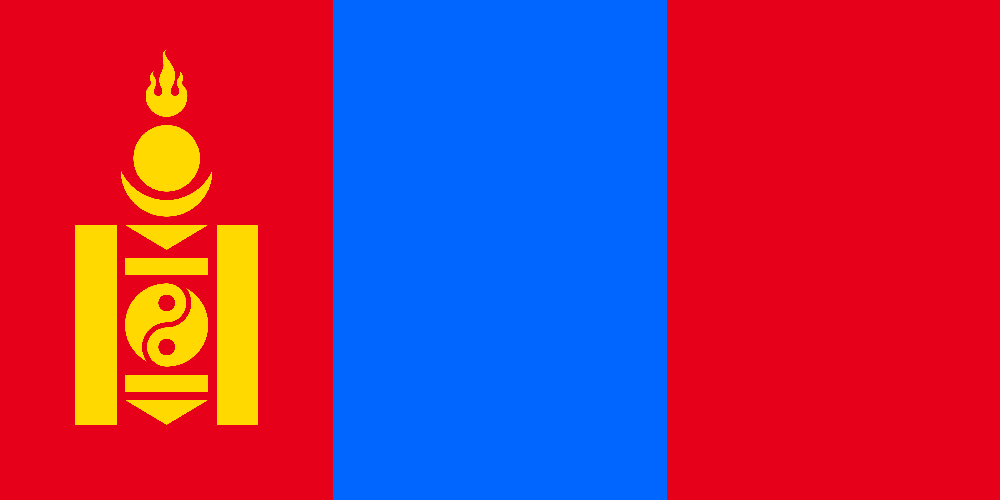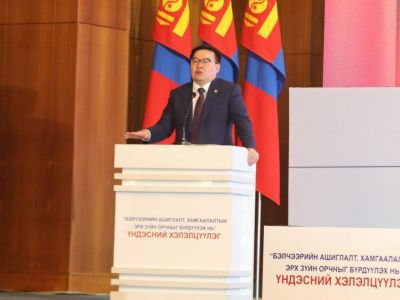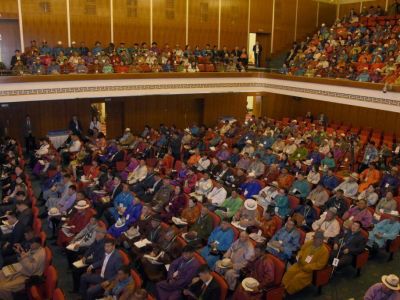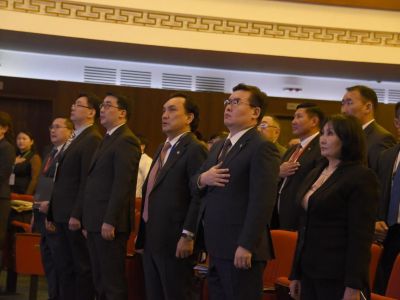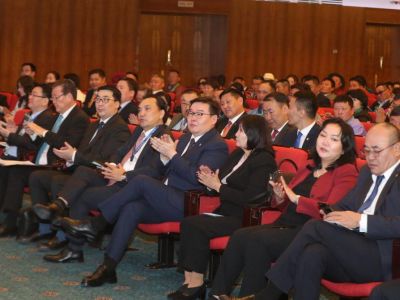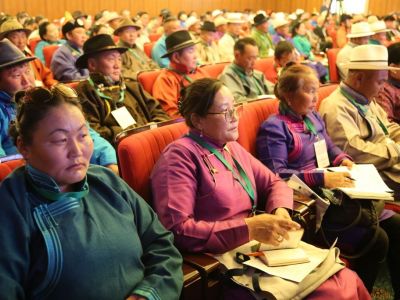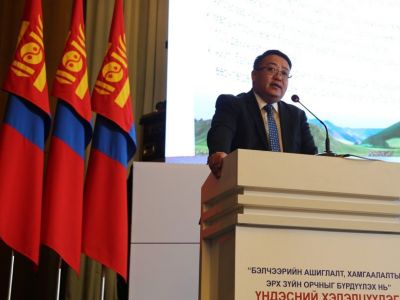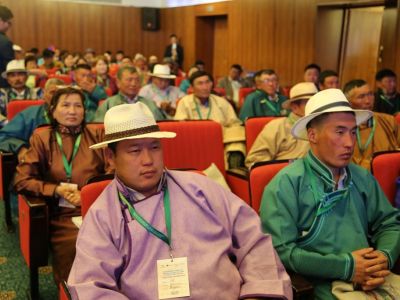The State Great Hural, the Ministry of Food, Agriculture and Light Industry, the Food and Agriculture Organization of the United Nations, and the Swiss Agency for Development and Cooperation's Green Gold and Animal Health Projects held a national discussion on "Creating a Legal Environment for Rangeland Use and Protection" at Government House. is organized. In addition to the Speaker, members of the State Great Hural, members of the Government, officials of the Office of the President of Mongolia, relevant ministries and agencies, 850 representatives of the Citizens' Representatives Hurals of 21 aimags, heads of Food and Agriculture Departments, herders and farmers participated in the national discussion. More than a dozen people are involved.
At the beginning of the discussion, the Speaker of the Parliament, G.Zandanshatar, spoke. He said, “First of all, I would like to express my sincere gratitude to Ms. Gabriela Spirli, Head of the Swiss Agency for Development and Cooperation in Mongolia and Head of the Swiss Consulate in Ulaanbaatar, for supporting and co-organizing the national consultation. Pastures and hayfields for livestock production occupy 96.1 percent of the total agricultural land in Mongolia. Herders account for 30.0 percent of the total labor force in the livestock sector. However, our economy has become too dependent on mining.
Policies and systems to benefit from raw materials such as wool, cashmere, and leather, which grow from non-growing gold, have been lost. As a result of your hard work, the number of livestock has reached 66.5 million. That's a good thing. However, the number of livestock per head of sheep has reached 110 million, exceeding the carrying capacity of rangelands by 25 million. Now is not the time to commit suicide. It is time to focus on protecting and improving Mongolia's independence, our primary source of livelihood, and the land, including pastures.
The Parliament of Mongolia, in cooperation with the United Nations Development Program and the Swiss Agency for Development and Cooperation, is organizing this forum with the participation of herders from 21 aimags and 330 soums, as well as experts from relevant ministries and departments. I hope that today we will discuss in small groups and listen to everyone's voice. We hope that we will discuss the common problems of our herders and find significant solutions to their problems. According to Mongolia's 2018 Rangeland Status Report, about 57.0 percent of pastureland has deteriorated to some extent. 10.3 percent of them are irreversible and are already at risk of desertification. This is a matter of concern.
Overcrowding of rangeland resources degrades the biodiversity of pasture ecosystems, changes plant composition, reduces rangeland, which is the main source of fodder, reduces the four-season migration, leads to soil degradation, and leads to pastureland and land disputes. As you know, there are many adverse effects and consequences, such as many factors that contribute to this. One of the two factors that must be considered is the introduction of livestock into the economy. We are implementing a project in this area in cooperation with the World Bank. The old system of processing and exporting meat and providing healthy food to the people has been lost. It needs to be restored.
If food is healthy, people are healthy. We need to export livestock and meat and use leather. Wool and cashmere will be shipped to the United States. A company called Mongol Wool produces cloth from Mongolian livestock wool. I would like to encourage you to make deals and clothes from this fabric. I'm wearing it myself. In this way, livestock products must be put into circulation. In 2012, 2016, and 2018, discussions were held with herders, local authorities, and experts in collaboration with the Food and Agriculture Organization of the United Nations and other projects and programs.
It is estimated that about 15.0 thousand herders participated in the discussion. According to the results of the most recent discussion in 2018, 77.9 percent of the participants answered, "It is necessary to pass a law on pastureland," 10.6 percent said "it is not necessary," and 11.5 percent said, "do not know." This shows that the vast majority supports the passage of the Law on Rangeland. Let's meet with herders and soum authorities and make the pasture paid, transfer the payment to the sheep's head, and use the money to fund the soum development fund. In this way, the number of livestock will be entirely correct.
Supporting local rangeland fees and fundraising initiatives will provide an opportunity to adapt and prevent climate change. However, it is up to the soum and aimag CRHs to decide whether the rangeland tax will be set or not. Such regulations can be reflected in the Law on Pastureland and the Law on Taxation. For example, the "Mongolian Cashmere" program is being implemented, and a meat processing plant is also established in the region. The main thing is to implement the state policy to support the agricultural sector. Social policy is moving from a welfare state to a productive society. The State Great Hural is holding today's discussion to listen to the views of herders and make decisions based on them.
Therefore, I would like to participate in the discussion, express my views freely and honestly, and support the adoption of realistic legislation. The most important thing Mongolians will leave to future generations is our land, nature, and fertile soil. Therefore, the policy of rangeland use, prevention, improvement, and protection of rangelands should be the basic policy of Mongolia's long-term development. We will work together to implement this policy and create a favorable legal environment for rangeland use and protection in Mongolia."
D.Bulgamaa, Green Gold-Animal Health Project Specialist, presented "Current Status of Rangeland in Mongolia." She noted that more than half of Mongolia's rangeland had been degraded to varying degrees, especially in areas with poor natural resilience, vegetation, and soil erosion. Participants were reminded of the need to ensure that the golden rule of pasture use, inherited from our ancestors, is not to overload, deplete fodder resources, and allow pasture plants to regenerate.
M. Enkh-Amar, Head of the Policy and Planning Department of the Ministry of Food, Agriculture and Light Industry, introduced the "Concept of Pastureland Law." According to the presentation, there are 112.1 million hectares of pastures and hayfields in Mongolia's agricultural lands, of which 1.5 percent are hayfields, and 96.1 percent or 110.4 million hectares are pastures. To date, however, there is no independent rangeland law. The draft law also seeks to end the irresponsible use of pastureland, use it according to its capacity, increase livestock, make a profit, and put it into economic circulation.
In addition, herder groups have established the right to use contracted rangeland, which strengthens the rational use and protection of contracted rangeland, strengthens the cooperation of local herders, and ensures social equity and justice that compensates for the damage caused. The project's initiators believe that it will have many benefits and effects, such as producing organic food, raw materials, and products from animals grazed by more than 100 species of rangeland plants and expanding the market.
After the keynote speeches, herders and representatives asked questions and expressed comments. Delegates stressed the need for immediate approval of the draft Law on Rangeland, as well as to reduce the number of livestock, develop procedures that focus on quality rather than quantity in selecting the best herders in the country, allow herders to own winter, spring and rotation lands, It was suggested that the Law on Rangeland should regulate the Gobi, Khangai, and steppe regions, and that care should be taken to ensure that rangeland is not destroyed when issuing mining licenses.

